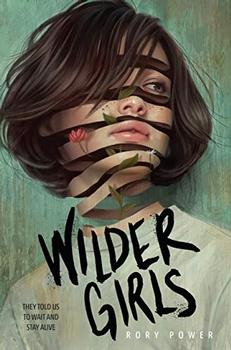Summary | Excerpt | Reading Guide | Reviews | Beyond the book | Read-Alikes | Genres & Themes | Author Bio

Inequality, poverty, colonialism, and capitalism run amok would not necessarily be themes one would expect to encounter in a science fiction novel written for young adults. But leave it to National Book Award winner M. T. Anderson to write exactly that. Anderson never sells his audience short, and in works as varied as his 2002 breakout novel Feed (another futuristic novel with themes about communication and connection that seem almost eerily prescient now) and his multi-award-winning duology The Astonishing Life of Octavian Nothing (an historical novel that explores thorny issues of race against the backdrop of the American Revolution), Anderson has never been afraid to tackle difficult or complex topics.
Anderson's Landscape with Invisible Hand might appear at first glance to be slight, even simple. At only around 150 pages, it is broken up into short chapters whose titles evoke still life paintings: "My House in Late Fall" or "Stuffed Animals in a Line." It turns out, though, that there's a lot to unpack from this slender suitcase. Its protagonist, Adam, is an aspiring artist (hence the chapter titles and vignette-like prose). And it also turns out that the still life genre is the only human visual art recognized and appreciated by humanity's new extraterrestrial colonizers, known as the vuvv.
The vuvv (who themselves look like bulky stone furniture and reproduce by spawning) have a distinctly superficial understanding of the humans they have colonized. They believe humans only paint "fruit in a bowl and stuff" and they adore so-called traditional human culture, which to them is epitomized by the saccharine doo-wop love songs and teen romantic comedies of the 1950s. So much do they idealize young human love, in fact, that Adam and his girlfriend Chloe have become their families' primary breadwinners by broadcasting to the vuvv pay-per-view, manufactured scenes of their romantic dates: "we baked snickerdoodles, or we just hung in a parking lot."
But there's trouble in paradise, at least off-camera; Adam and Chloe secretly can't stand one another. Chloe, in particular, has grown cruel to Adam, who chronically suffers from a horrific intestinal disease caused by the vuvvs' cost-saving measures that cut back on municipal water purification. But both families' economic prospects are growing worse – the vuvvs' promises of economic prosperity and ease have actually resulted in the near-collapse of the human economy – so what choice do Adam and Chloe have but to continue their lucrative charade?
Everyone in Adam's life is old enough to remember the vuvvs' initial invasion, to recall their overlords' promises of vuvv technical innovation "that would heal all disease and do all our work for us." But no one, least of all Adam and his family, can truly comprehend just how quickly and drastically ordinary life fell apart for average humans – the ones who weren't already super-wealthy and consequently able to invest in vuvv tech directly. The speed of this collapse is perhaps what makes Landscape with Invisible Hand most chilling – that and the complicity with which most humans initially viewed their colonizers. Certainly Anderson's novel is a work of speculative fiction, but that's because it prompts readers to ask their own questions about economic disparities, enforced inequality, ethnocentrism, and (just maybe) art's ability to shed a clearer light on all of these troubling issues, both in Adam's world and in our own.
Thanks in large part to its slender size, Landscape with Invisible Hand is a novel that lends itself to repeated readings, study, and discussion, as readers contemplate parallels between Adam's near-future and our own present time, asking themselves what can be done differently and what should be preserved at all costs.
![]() This review was originally published in The BookBrowse Review in September 2017, and has been updated for the
May 2019 edition.
Click here to go to this issue.
This review was originally published in The BookBrowse Review in September 2017, and has been updated for the
May 2019 edition.
Click here to go to this issue.

If you liked Landscape with Invisible Hand, try these:

by Charles Burns
Published 2024
The beloved and award-winning author of Black Hole's haunting and visually arresting story of an artist's obsessions, and the value and cost of pushing the boundaries of creativity.

by Rory Power
Published 2020
A feminist Lord of the Flies about three best friends living in quarantine at their island boarding school, and the lengths they go to uncover the truth of their confinement when one disappears. This fresh, new debut is a mind-bending novel unlike anything you've read before.
Your guide toexceptional books
BookBrowse seeks out and recommends the best in contemporary fiction and nonfiction—books that not only engage and entertain but also deepen our understanding of ourselves and the world around us.